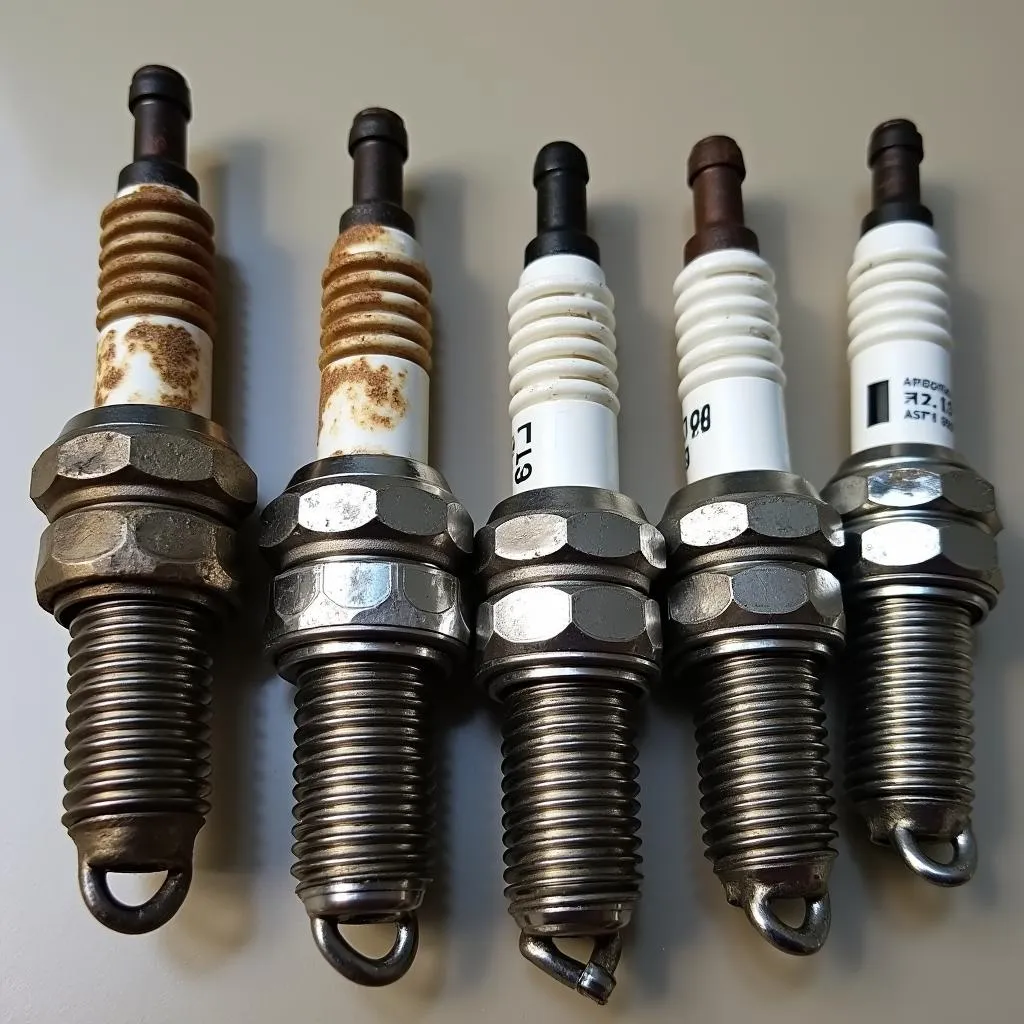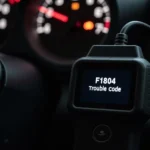A flashing check engine light and the dreaded P0300 code – a frustrating experience for any Volkswagen owner. This code indicates random cylinder misfires, a common yet potentially complex issue. This comprehensive guide delves into the intricacies of the OBD2 P0300 code in Volkswagen vehicles, equipping you with the knowledge to diagnose and address this problem effectively.
Decoding the P0300 Code in Your VW
The P0300 diagnostic trouble code (DTC) signifies that your car’s engine control module (ECM) has detected random misfires across multiple cylinders. Unlike codes like P0301 (cylinder 1 misfire) or P0302 (cylinder 2 misfire), which pinpoint a specific cylinder, P0300 indicates a broader issue affecting the engine’s combustion process inconsistently across various cylinders.
Common Culprits Behind the P0300 Code in VWs
A myriad of factors can contribute to random misfires in Volkswagen engines, ranging from relatively simple fixes to more complex mechanical issues.
1. Ignition System Faults
A faulty ignition system is often the primary suspect in P0300 cases. Worn-out spark plugs, degraded ignition coils, or damaged spark plug wires can disrupt the spark delivery, leading to incomplete combustion and misfires.
 Worn Out Spark Plugs Compared to New Ones
Worn Out Spark Plugs Compared to New Ones
2. Fuel System Issues
Inconsistent fuel delivery or inadequate fuel pressure can also trigger the P0300 code. Clogged fuel injectors, a malfunctioning fuel pump, or a restricted fuel filter can starve the engine of the fuel it needs for proper combustion.
3. Vacuum Leaks
Vacuum leaks within the intake manifold or vacuum hoses can disrupt the air-fuel mixture, causing lean conditions and leading to misfires. These leaks can be particularly elusive to diagnose.
4. Sensor Malfunctions
Faulty sensors, such as the mass airflow sensor (MAF), manifold absolute pressure sensor (MAP), or oxygen sensors, can send inaccurate readings to the ECM. This disruption in data can lead to an improper air-fuel mixture and subsequent misfires.
5. Mechanical Problems
In more severe cases, mechanical problems like low compression due to worn piston rings, burnt valves, or a faulty head gasket can contribute to the P0300 code. These issues often require extensive engine work to rectify.
Diagnosing the P0300 Code: A Step-by-Step Approach
Identifying the root cause of the P0300 code requires a systematic diagnostic approach:
-
Scan for Codes: Begin by connecting an OBD2 scanner to your VW’s OBD2 port to retrieve the stored trouble codes. Note any additional codes alongside the P0300, as they can offer valuable clues.
-
Inspect the Ignition System: Visually inspect the spark plugs for wear and tear, checking for signs of fouling, excessive gapping, or damage. Assess the condition of the ignition coils and spark plug wires for any cracks, burns, or loose connections.
-
Fuel System Check: Check the fuel pressure using a fuel pressure gauge to ensure it meets the manufacturer’s specifications. Inspect the fuel injectors for clogging or leaks.
-
Vacuum Leak Test: Inspect the intake manifold and vacuum hoses for any signs of cracks, loose connections, or damage. Use a carburetor cleaner or a smoke machine to test for leaks.
-
Sensor Evaluation: Employ a multimeter to test the functionality of the MAF sensor, MAP sensor, and oxygen sensors. Refer to the vehicle’s repair manual for specific resistance and voltage values.
-
Compression Test: If other potential causes have been ruled out, perform a compression test to assess the engine’s mechanical integrity. Low compression in one or more cylinders can indicate internal engine problems.
Addressing the P0300 Code: Effective Solutions
Once you’ve pinpointed the underlying cause, implement the appropriate repair strategy:
-
Ignition System Repairs: Replace worn-out spark plugs, faulty ignition coils, or damaged spark plug wires with high-quality OEM or equivalent parts.
-
Fuel System Maintenance: Clean or replace clogged fuel injectors, replace a malfunctioning fuel pump, or install a new fuel filter to ensure optimal fuel delivery.
-
Vacuum Leak Repair: Seal any detected vacuum leaks by replacing damaged vacuum hoses, tightening loose connections, or repairing cracks in the intake manifold.
-
Sensor Replacement: Replace faulty sensors with new ones that meet the manufacturer’s specifications. Ensure proper installation and calibration for accurate readings.
-
Mechanical Repairs: Address mechanical problems, such as worn piston rings, burnt valves, or a faulty head gasket, through engine rebuild or component replacement.
Preventing Future P0300 Codes in Your VW
Regular maintenance plays a crucial role in preventing the recurrence of the P0300 code:
-
Adhere to Scheduled Maintenance: Follow the manufacturer’s recommended maintenance schedule for spark plug replacements, fuel system cleaning, and other essential services.
-
Use High-Quality Fuel: Opt for reputable gas stations and use high-quality fuel to prevent fuel system contamination and maintain optimal engine performance.
-
Address Issues Promptly: Address any warning signs, such as rough idling, engine hesitation, or decreased fuel efficiency, without delay to prevent minor issues from escalating into major problems.
Conclusion
The OBD2 P0300 code in your Volkswagen, while concerning, is a solvable problem. By understanding its potential causes and employing a systematic diagnostic approach, you can effectively identify and address the underlying issue. Remember, regular maintenance is key to preventing future occurrences and ensuring the smooth and efficient operation of your Volkswagen engine.
Frequently Asked Questions (FAQs)
Can I still drive my VW with the P0300 code?
While technically possible, driving with the P0300 code is not recommended. It can lead to further engine damage and potentially leave you stranded.
How much does it cost to fix the P0300 code?
The repair cost varies depending on the underlying cause. Simple fixes like spark plug replacement can be relatively inexpensive, while more complex engine work can be costly.
Can a bad catalytic converter cause a P0300 code?
While a failing catalytic converter can cause other issues, it typically doesn’t directly trigger the P0300 code.
Can a bad battery cause a P0300 code?
A weak battery can sometimes contribute to misfires, but it’s less likely to be the sole cause of a P0300 code.
How often should I change my VW’s spark plugs?
Refer to your VW’s owner’s manual for specific recommendations. However, a general rule of thumb is to replace spark plugs every 30,000 to 60,000 miles.
Need Further Assistance?
If you require additional support in diagnosing or resolving your VW’s P0300 code, our team of expert technicians is ready to assist you. Contact us via WhatsApp at +1(641)206-8880 or email us at [email protected]. We offer 24/7 customer support to address all your automotive needs.
For more information on OBD2 codes in Volkswagen vehicles, you can find detailed articles on our website, such as obd2 en vw passat 1997 2.8 6 cilindro and obd2 vw eurovan 2002.

